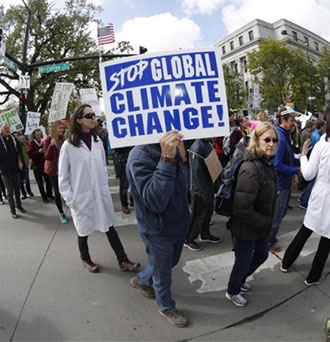
The UN Intergovernmental Panel on Climate Change recently reported that humanity has 12 years to take dramatic action to avert climate catastrophe. Not surprisingly, this ultimatum got all the headlines, but buried beneath the report’s punchline was a less covered “solutions chapter” that hinted at some good news: Yes, addressing climate change will require a tremendous global effort, but we actually already have all the technology and policy solutions at our disposal. All we are missing is the political will.
Good news, right? Well, sort of. In politics, some years offer more opportunities for change than others. And in the United States, we have only three presidential elections over the next 12 years, two chances to elect each class of U.S. Senators, and just one round of redistricting that will lock in congressional and state legislative districts through 2032. So, while in theory we may have 12 years to act, America’s last best chance is actually right around the corner.
In the fight against climate change, 2020 may be the most important year any of us will live through.
Fortunately, the climate movement is starting to flex its muscles at just the right time. The 2018 midterms weren’t just a Blue Wave; they were also a Green Wave, with environmental voters showing up like never before. Midterm exit polls revealed that 7 percent of all voters saw “the environment” as “the most important issue facing the country,” enough to place it fifth on the list of voter priorities, just below gun policy and above issues like terrorism, foreign policy, taxes and abortion.
At first glance, 7 percent might not seem like a lot, but this represents a dramatic shift in the electorate. (We’ve seen this progress at the Environmental Voter Project in our work turning out climate voters.) In the 2014 midterms and the 2016 presidential election, barely 2 percent of likely voters listed “the environment” as their top priority.
Moreover, in real terms, 7 percent represents an enormous number of voters. Of the 118 million people who voted in 2018, more than 8 million voters cared more about the environment than anything else. Eight million people who vote on environmental issues is an enormously powerful constituency -- far surpassing the NRA’s entire national membership.
And this green wave of voters is already beginning to have greater influence.
Politicians read polls with an almost religious devotion, and when they see that voters are beginning to care deeply about an issue, they react almost immediately.
Senate Minority Leader Chuck Schumer has said he won’t support an infrastructure bill unless it addresses climate change, #GreenNewDeal is trending on Twitter and presidential hopefuls including Bernie Sanders, Jay Inslee, Tom Steyer, Michael Bloomberg, and Jeff Merkley are all signaling that climate change will be a central focus if they run for the White House.
Two years ago, America watched three Presidential debates without a single question on climate change. Now, politicians are practically tripping over themselves to appeal to a newly energized movement of climate voters.
Ultimately, though, this green wave won’t amount to much unless environmental voters keep ratcheting up the pressure. To avert catastrophe, the climate movement needs to hit a grand slam on Election Day in 2020, and the best way to hit a grand slam in 2020 is to load the bases in 2019 – by showing up at the polls.
Over 100 million Americans have elections in 2019, including statewide elections in Kentucky, Louisiana, Mississippi, New Jersey and Virginia, plus hundreds of mayoral elections, including in five of the country’s 10 biggest cities (Chicago, Phoenix, Philadelphia, San Antonio and Dallas). These elections are important in their own right -- state and municipal policies have a major impact on climate change -- but they also provide an important opportunity for climate voters to stand up and be counted ahead of the 2020 elections.
As candidates for office look for votes in 2020, they will comb through public voter files and prioritize the opinions of the most consistent voters. Those who have a history of showing up to vote, will get attention; those who don’t, will be ignored. The world can’t afford for the climate movement to be ignored in 2020.
The climate crisis will likely be won or lost not in a laboratory, but on the political battlefield. If we’ve learned anything in the last two years, it’s that voting matters and elections have consequences. The next two years will define our path.
